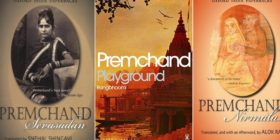Kishore Kumar’s musical journey started with an injury.

His brother Dada Muni Ashok Kumar once revealed that a young Kishore had a terrible voice. But once he cut his big toe at home and the injury made him cry all the time. He would wail all day and night and, as Dada Muni put it, uska gala khul gaya.
So, we can credit the pre-pain killer era for giving Kishore da all the riyaaz he needed to become the voice of India a few decades later.
Kishore’s quirky side was first noticed by his friends at Indore’s Christian College, where he was dispatched by Dada Muni from hometown Khandwa. Kishore would roam around wearing a loose overcoat, pyjamas, muffler and leather sandals even in peak summer.
He believed removing the overcoat would bring him bad luck and wouldn’t discard it even after being beaten, ragged and laughed at for his strange attire. Once, when a football player fell ill, Kishore entered the ground as a replacement, in his full sartorial glory, making the crowd go wild.
Nights were, of course, reserved for mehfils that drew student, teachers and even the warden to his room. Together they would create so much hungama that once a newspaper reported that the hostel had become a den of ruffians. Undeterred, the boys had an all-night concert that night.
For several years, one of the walls of his hostel room stood witness to his eccentricity. On it was scribbled Kishore’s name, in his own handwriting, in his favourite style, in reverse: Ramaku Rashoki.
When Kishore left the college in 1948, he owed a debt of Rs 5 and 12 anna (75 paise) to the canteen. Years later, memories of that song were to inspire one of Hindi cinema’s classics in a film starring the three brothers and Madhubala.
By the time Kishore became a teenager, Dada Muni had established himself as a doyen of Hindi cinema. So, when he heard of Kishore’s exploits in the college, Ashok Kumar summoned him to Bombay. And soon the youngest of the Ganguly brothers got an audience with Kundan Lal Sehgal, starting a journey that is now a legend.
Just like the overcoat he used to wear in college, Khandwa also became a part of Kishore’s life. Later in life, during live shows Kishore would appear on the stage singing, dancing, jumping, making faces and finally greeting the audience with an “Naana-naani ko, Daada-daadi ko, Bhaiyya-bhabhi ko, Chunnu-Munnu ko, Aap sabhi ko Kishore Kumar Khandwe waale ka pyaar bhara namaskar”.
To call Kishore a modern mystery and bundle of contradictions would not be an exaggeration. Asha Bhonsle once recounted how Kishore would come for recording with an invisible child, constantly chatting, laughing and playing games with him. At his Mumbai residence, he had swings in his garden, where he would talk with trees, addressing them by name.
A producer once got the shock of his life when he went to meet Kishore at home. The legendary singer had a chain around his neck and was sitting close to a placard saying the dog should not be disturbed. The producer thought this was one of Kishore’s usual pranks and extended his hand to ask him to get up. Guess what? Kishore started growling and bit the producer’s hand. On another occasion, after returning from a pilgrimage, he started acting like a sadhu, grew a beard, began wearing saffron robes and giving aashirwaad to everyone around him.
Legends abound of his love for money. It is said he would not record a song unless the money was paid in advance. Sometimes, to make his producers pay up, Kishore would act mad on the sets, jump around, do somersaults and disappear.
Yet, the same kanjoos Kishore stood up to the might of Indira Gandhi during the Emergency. When asked to sing at a party function, he refused, inviting a ban. His friends say when he was advised against not taking on Sanjay Gandhi and his mother, Kishore asked, “Ye kaun hai?” and started chortling like a child.
Was this playacting? Did he exhibit schizophrenic tendencies? Were there lots of children and men locked inside one Kishore Kumar? Was he lonely in this world in spite of the world falling at his feet? Did he want to be left alone when not in a studio? Frankly, nobody can answer this convincingly. Suffice to say that the genius in him extracted a huge price.
To call Kishore Kumar a modern mystery and bundle of contradictions would not be an exaggeration.
The only fact that is relevant today is that when this quirky man faced a mic, he transformed into the voice of India, gave us some of our greatest songs of joy, love, sorrow and laughter. All this without even a day’s training in singing. Someone who sang like a child, woman (O Gujariya), an incurable romantic, an incorrigible prankster, philosopher and a sage — in fact in every role life offers a man. The great singer who not just competed with the likes of Mohammad Rafi, Mukesh and Manna Dey but left them way behind on the popularity charts. Today, if you tune into any FM radio station, I can bet that the number of Kishore songs they play far outnumber any other singer.
The only explanation for his immortal popularity is that you can’t imagine anyone else singing the songs he did. There was, and will be, just one Kishore Kumar. Nobody could have had the bass of his voice — Mohammad Rafi for all his classical training and silky voice was a bit effeminate — an entire range of emotions from melancholia to masti and the knack of effortlessly modulating his voice to suit the actor for whom he was singing.
When you listen to Tum Aa Gaye Ho (Aandhi), Ye Shaam Mastani (Kati Patang), Kya Mausam Hai (Doosra Aadmi), Rimjhim Gire Sawaan (Manzil) — songs that combine solitude, romance and elements — and notice how you could almost picture Sanjeev Kumar, Rajesh Khanna, Amitabh Bachchan and Rishi Kapoor, all of whom were vastly different from each other, singing these great melodies.
Incidentally, this is how he met Pancham, the legendary composer of many of his classics. In RD Burman’s words:
“I had moved to Bombay from Calcutta to join my father as an assistant. When we went to the Kardar studio, I saw a man sitting on the boundary wall, wearing pyjamas and a muffler. I was curious so went up to him and asked him who he was,” recalled RD Burman.
“By this time, one of his shoes had fallen off. So he asked me to pick it up. When I did, he introduced himself, ‘I am Kishore Kumar Khandwa wala. Thank you, Sadhu.'”
And thus a great partnership was born.
It is India’s great misfortune that Kishore died while he was still at the peak of his singing. When he died, India was on the cusp of digital music, 24 hour TV, live concerts and maestros like AR Rahman. How the heart yearns for a few more years of the god of Indian playback singing, even though he has become immortal!
Let us wish this legend happy birthday with some of his immortal songs:





Leave a reply